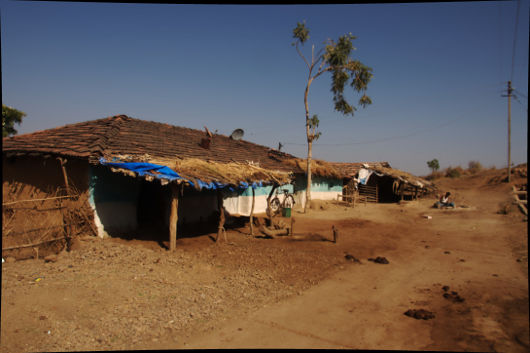



This project not only addresses the forest conservation issue but also takes a step ahead in developing a model that could be replicated in several other villages inhabiting the forest areas. This project started in 2012 by AID Johns Hopkins University has already been spreading in the region. The idea is that the forest around the village be managed, grown and protected by the villagers. Under the forest rights act of India, the Paivihir village has got 190 hectares of forest land under the local government village body called Panchayats. This enables Panchayat to implement employment guarantee schemes by government of India into the forest. The result is people are employed and forest is protected. The villagers have also volunteered to plant trees with participation of 120 women and 100 men.
The total estimated support needed is $2000.
The Region:
Payvihir is a village of 110 families (mainly from the Korku tribe and some from Balai) at the foothills of Melghat region of Amravati district in Maharashtra. The once rich forests have been depleted taking with it the biodiversity of the region.
Awards and Recognition:
In May 2014 the village of Payvihir won the UNDP biodiversity award for its forest conservation efforts! Read the ToI article.
AID's Support:
Khoj, a partner of AID has been working with the communities in the area since 1996. AID has supported the work of Khoj since 2008 and the eco villages since 2011. Volunteers have also connected them to C Srinivasan who works extensively on waste management across India
The Work:
- Khoj facilitated the recognition of 190 hectares of land under Forest Rights Act (2006), which gives rights to the Gram Sabha to regenerate, manage and use non-timber produce from the land sustainably
- The villagers, with the help of Khoj planted 50,000 trees and tended to them under Mahatma Gandhi National Rural Employment Guarantee Act (MGNREGA)
- Villagers also constructed check dams and other soil & water conservation structures (continuous collecting trenches and water absorption trenches) using MGNREGA funds
- Overgrazing is a major reason for deforestation. Village committees have demarcated specific areas for grazing and routinely guard afforested areas.
- Planting fodder has helped with rearing cattle. Cattle dung is used for a piped distribution bio-gas system in the village to reduce dependence on forest for fuel
- Zero waste generation in the village
- Small and marginal farmers have moved to sustainable organic agriculture
- One member of each household is connected to a means of livelihood - tendu leaf collection, sale of fruit from trees
The Strategy:
- Establishing the rights of tribal communities over forests under the Forests Right Act, 2006
- Regenerating natural resource base by community efforts and effectively using Govt funds available under MGNREGA
- Providing means of livelihood to the youth
The Impact:
- Deers, bears, jackals, birds, wild boars, sambars have come back to the area
- Greening of the hills with diverse flora
- Employment opportunities hence decrease in migration
- Increase in local employment - tendu leaf collection, NREGA work, sale of fruits from fruit trees
- Harmonious connection of the community to the forest has been re-established
- Increase of water level in the wells in the villages
